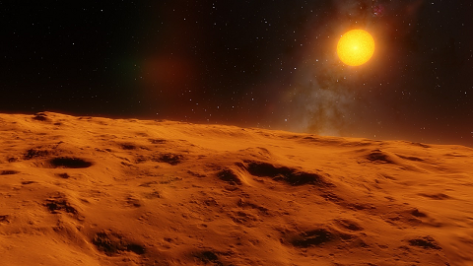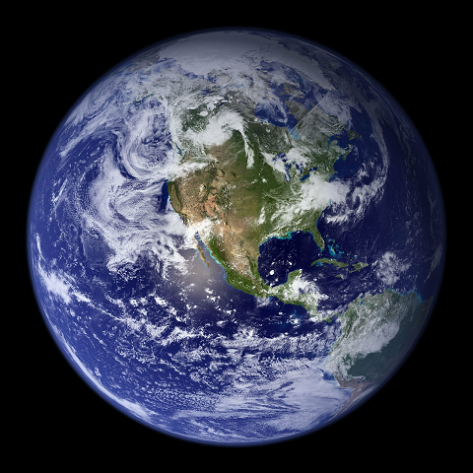From Natural News:
The idea of heading out to space and traveling to the red planet is thrilling but consider this for a moment: Going to Mars significantly increases your chances of acquiring cancer. That’s what the latest study published in Scientific Reports concluded. Cancer risk for humans who go on a mission to Mars or on long-term space missions doubled because of exposure to radiation from cosmic rays. Being away from the protection of Earth’s magnetic field increased the risk of radiation because cosmic rays which contain iron and titanium atoms severely damage the cells due to very high rates of ionization.
That’s a fascinating and well-done article, so you’ll want to read the whole thing, but here’s the bottom line: There is no Planet B.
Occasionally, I’ll hear from science fiction aficionados who fancy that one day, humans will spread out across the galaxy. We must, they say, because when Earth dies, we’ll just blast off and leave this old burned-out hulk behind for new, more exciting worlds. Problem is, even if we proved Einstein wrong and developed faster-than-light travel, we can’t just pack up and leave Earth the way we can move to other states or countries.
The beautiful planet we’re on is where we originated, and where we live. We used to think people were autonomous entities, but in fact, our lives depend on Earth’s many processes. It hasn’t been that long that we’ve come to appreciate the existence and our relationship with gut flora, which help regulate our immune system, our digestion, and even the way our minds work. And look at the essential relationship we have with mitochondria, those living things with their own DNA, and without which we could not function.
We’re not monads, those free-floating, ultimately simple entities cooked up by rationalistic philosophers. We’re humans, evolved beings with deep, deep roots in the natural world, and here is where we were meant to be.


It’s still a nice dream, though. And honestly, if I were younger, and was given the opportunity, I think I’d chance it. What an adventure it would be!
LikeLiked by 1 person
Just remember the failures of both Biosphere projects. You’d be shut up in a sealed environment rather than beaming down to an earth-like planet with breathable air.
LikeLiked by 2 people
True…
LikeLike
The premise makes for great science fiction but we’d have to find out how to reproduce the conditions of Earth and honestly we don’t even fully understand all of the intricacies of our relationship with the Earth yet. That’s why we need to take care of the planet we’re already on. Still, it’s interesting for speculative fiction.
LikeLiked by 2 people
True. Fun to pretend.
LikeLiked by 1 person
Excellent post!
LikeLiked by 2 people
Jennie,
Thank you!
LikeLiked by 2 people
You are welcome, Mike!
LikeLiked by 1 person
Red isn’t my color so I’ll pass on the trip to Mars, Mike, but nice, thought-provoking post. Far, far better to stay on Earth and find a cure for cancer than traveling out and dying from it.
“No matter where you go, there you are.” Meaning, sadly, we are harming this planet, no reason to believe we wouldn’t do the same to another.
LikeLike
Seems we’re only now really beginning to understand, in this era of climate change, just how symbiotically linked we are to this planet that hosts us. We tend to think we own the Earth… but, in truth, it owns us.
LikeLiked by 1 person
Agreed!
LikeLiked by 1 person
I’ll stick with EARTH. Enjoy the day.
LikeLiked by 1 person
MG Wells,
Me too!
LikeLiked by 1 person
We don’t know our boundaries.
LikeLiked by 1 person
Which is another way of saying we don’t know who we are.
LikeLike
But we could send mosquitos and deer ticks to live there.
LikeLiked by 1 person
GraiceLil Escapegoat,
All we have to do is lure them into those little pods.
LikeLiked by 1 person
use me as bait. Not to brag, but mosquitoes travel from as far away as Ethiopia just to sample me.
LikeLiked by 1 person
It’s so funny to me that we believe we can just throw away our planet the way we throw away everything else. It really is the ultimate self-betrayal.
LikeLiked by 1 person
KE Garland,
Sad but true.
LikeLiked by 1 person
+1. Biggest question is, will we ever learn from the lessons of the past? Probably not.
LikeLiked by 1 person
Maybe not as far-fetched as it may seem. We probably wouldn’t enjoy living on Mars much (we would be stuck indoors most of the time due to said radiation), but there’s no reason Man couldn’t survive there with the technologies that already exist.
LikeLike
Anton Kossman,
I quite agree with your first point: mankind has proven remarkably resistant to learning from his own experience.
So why would we imagine that a species of such limited rationality, which doesn’t even know what it CAN know, would manage to know that which it CANNOT know?
LikeLike